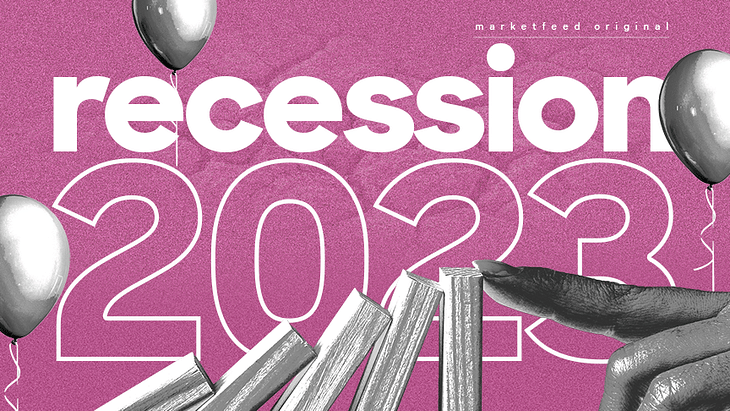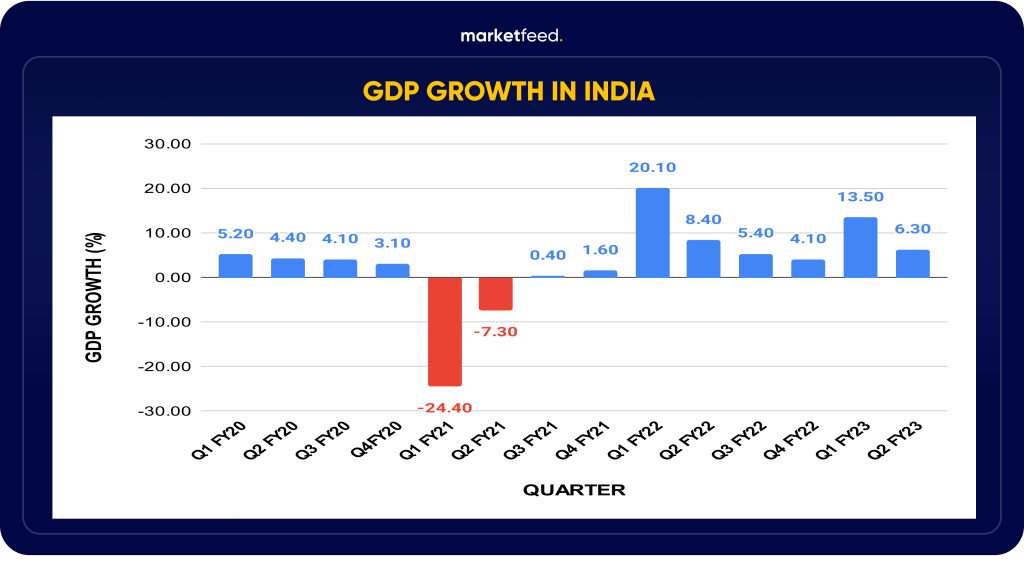How to Deal With a Recession in 2023?

2022 was a rollercoaster of a year for the global economy! Most sectors had just started showing signs of recovery after two pandemic-hit years. Unfortunately, Russia’s invasion of Ukraine, a cost-of-living crisis triggered by inflationary pressures, and the slowdown in China have hurt economic sentiments again. As we approach 2023, there are talks of an economic recession heading our way.
In today’s article, we’ll discuss what a recession is, whether we’re really in one, and how we can deal with it intelligently.
What is a Recession?
A recession is a prolonged period of economic downturn. It’s typically indicated by a fall in the gross domestic product (GDP), an increase in unemployment, and a decline in consumer spending. GDP is the total market value of all the finished goods and services produced within a country’s borders during a specific period.
Economists generally agree that a technical recession happens when the real GDP growth (or inflation-adjusted GDP) declines for two quarters consecutively. It can be caused by a decline in consumer confidence, a fall in business investment, or an increase in interest rates. [When interest rates are hiked or the cost of borrowing rises, people will have to pay more to repay debts, thereby reducing their purchasing power. There will be less money in the hands of people to spend, and thus, businesses get less revenue.]

So during a recession, businesses may struggle to stay afloat. It can be difficult for people to keep their jobs or find new ones. Governments may have to provide extra support to citizens and businesses through financial assistance or stimulus packages. Like most countries, India entered a recession in FY21 due to strict lockdowns imposed by the government to curb surging Covid-19 cases.
Will There Be a Recession in 2023?
Many financial experts and institutions (including the Centre for Economics & Business Research) have predicted a global recession to begin in 2023. WHY? Well, multiple factors such as rising interest rates (to curb inflation), trade tensions, and global political uncertainty can contribute to a prolonged economic downturn.
In fact, the International Monetary Fund’s (IMF) annual economic forecast has predicted sluggish global growth in 2023. It gives attention to three issues: Russia’s invasion of Ukraine and its impact, the long-term effects of the Covid-19 pandemic (especially in China), and high inflation & tight monetary policies. We could be paying the price for trying to bring down inflation to more comfortable levels!
Impact on the Stock Market
Stock prices tend to fall during a recession as companies struggle to maintain profitability and investors quickly withdraw their funds from the market. Such a bear market can help you buy stocks of fundamentally-strong companies at cheap prices! You could essentially take a look at your investment portfolio now and make the necessary adjustments for such a scenario.
How to Deal With a Recession in 2023:
Now, many of you might be freaking out about losing your jobs and life savings. But don't panic! Here are some simple tips for surviving a recession in 2023:
- Build an emergency fund: We can’t stress how important this is! An emergency savings fund can provide a buffer against unexpected job losses, expenses, and other financial setbacks that may occur during a recession. Aim to save up to 4-6 months' worth of living expenses, or more if possible.
- Manage your debt wisely: High levels of debt are like having a giant weight strapped to your back during a recession. They'll make it harder to stay afloat if your income takes a hit. So pay down as much debt as possible before the recession hits, and prioritize the debts with the highest interest rates.
- Cut unnecessary expenses: Look for ways to reduce extravagant expenses (such as dining out) and find ways to save on necessities like groceries and utilities.
- It may become necessary to explore alternative sources of income to help make ends meet during a recession. Consider taking on part-time or freelance work or starting a side hustle. You could even learn to trade and make money consistently from the stock market! (Visit marketfeed.com 🚀)
- Seek financial assistance: If you're struggling to make ends meet during a recession, don't be afraid to ask for help. There are government programs and other resources that can provide financial assistance, such as unemployment benefits and food/grocery stamps.
- Keep an eye on economic conditions and be ready to adjust your financial plan whenever required. This includes reassessing your budget, adjusting investments, or finding new ways to generate income.
These are just a few pointers on our survival guide for the next recession. It may not be an easy ride for many. But with a little bit of preparation and some flexibility, you'll be able to weather the economic storm and come out stronger on the other side!
Are you prepared to face an economic recession? Let us know in the comments section of the marketfeed app!


Post your comment
No comments to display